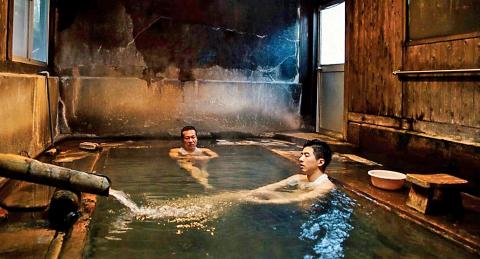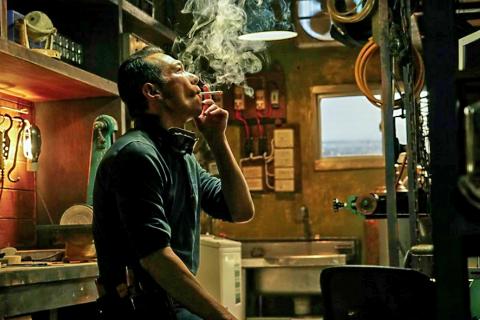Much is left unsaid in Father to Son, but as relationships between fathers and sons go, especially in Asian culture where affection is not always openly expressed, how much can be explicit?
The storylines and relations seem complicated in this poignant, subtle drama as it follows a 60-year-old, still rather dashing Fan Pao-te (Michael Huang, 黃仲崑), who falls ill at the beginning of the film and tries to come to terms with mortality and closure, especially with his father, who abandoned the family when he was young to seek his fortune in Japan.
Fan and his son (Fu Meng-po, 傅孟柏) are the focus of the main plot, but the film also spotlights many other characters while flashing back throughout Fan’s childhood and young adulthood. The parallels among fathers and sons, especially the relationships — or lack thereof — are apparent and it’s clear that history repeats itself in this small southern town. But fate can also be changed.

Photo courtesy of atmovies.com
The cinematography is stunning, and director Hsiao Ya-chuan (蕭雅全) chooses his backdrops well. Although the story is set mostly on one street in a sleepy, nondescript town, it fully makes use of the notion of being stuck in time with an old hotel, a traditional laundry shop with a sign emblazoned with black and gold calligraphy and a Japanese era-style hospital with terrazzo floors and long, narrow hallways. Even the hostess club that Fan and his buddy frequent, the roadside stall where they drink or Fan’s hardware store are shot in a way that creates an air of the fantastic even though it’s clear that this is reality.
Is this 2018 or 1987? Although the flashbacks are made clear in black and white, sometimes it is hard to tell until someone whips out the latest model smartphone — and then things become blurred again as people are seen smoking in offices and restaurants when Fan visits Japan. Maybe it doesn’t matter, as some things simply don’t change no matter what the era.
Through Fan’s father, the story also stretches back to post-war Taiwan, depicting a society that still retains some of its old Japanese connections, and where people would prefer to head overseas to make it big than stay at home as a nobody.

Photo courtesy of atmovies.com
This is Hsiao’s third feature film since 2010’s Taipei Exchange (36個故事), continuing his poetic style of never directly tackling the subject but instead telling the story through delicate sentiments and subtle relationships. Although the film seems all over the place at the beginning, as the plot progresses, nothing is superfluous as there’s a whole backstory spanning many decades that slowly ties things together.
Although Fan chose a simple life as a hardware store owner and amateur inventor, he’s highly intelligent and deeply philosophical, making for a complex character that’s intriguing from the very beginning as he heads out to fix a friend’s electrical problem with his tools around his belt as if he were a cop heading to solve a crime.
His counterpart is his buddy A-kao (Long Shao-hua, 龍劭華), the carefree owner of a fruit store, who, although is not a major part of the film, does a brilliant job in providing chuckles and dragging Fan into his shenanigans. His elated expression when Fan, who had abstained from drinking since he fell ill, finally took a sip of beer, is priceless.
Fu also delivers a good performance as the son, and even though father and son do not seem to exchange many words, their affection and love for each other are clearly felt.
Hsiao is indeed deserving of best director at this year’s Taipei Film Awards, where the film also picked up best original score (Summer Lei, 雷光夏 and Chris Hou, 侯志堅) and best art direction. It’s a movie that’s meant to be felt and pondered upon, leaving the audience for much reflection long after the curtain draws.

Taiwan has next to no political engagement in Myanmar, either with the ruling military junta nor the dozens of armed groups who’ve in the last five years taken over around two-thirds of the nation’s territory in a sprawling, patchwork civil war. But early last month, the leader of one relatively minor Burmese revolutionary faction, General Nerdah Bomya, who is also an alleged war criminal, made a low key visit to Taipei, where he met with a member of President William Lai’s (賴清德) staff, a retired Taiwanese military official and several academics. “I feel like Taiwan is a good example of

March 2 to March 8 Gunfire rang out along the shore of the frontline island of Lieyu (烈嶼) on a foggy afternoon on March 7, 1987. By the time it was over, about 20 unarmed Vietnamese refugees — men, women, elderly and children — were dead. They were hastily buried, followed by decades of silence. Months later, opposition politicians and journalists tried to uncover what had happened, but conflicting accounts only deepened the confusion. One version suggested that government troops had mistakenly killed their own operatives attempting to return home from Vietnam. The military maintained that the

Taipei Mayor Chiang Wan-an (蔣萬安) announced last week a city policy to get businesses to reduce working hours to seven hours per day for employees with children 12 and under at home. The city promised to subsidize 80 percent of the employees’ wage loss. Taipei can do this, since the Celestial Dragon Kingdom (天龍國), as it is sardonically known to the denizens of Taiwan’s less fortunate regions, has an outsize grip on the government budget. Like most subsidies, this will likely have little effect on Taiwan’s catastrophic birth rates, though it may be a relief to the shrinking number of

Since its formation almost 15 years ago, Kaohsiung rock band Elephant Gym (大象體操) has shattered every assumption about contemporary popular music, and their story is now on screen in a documentary titled More Real Than Dreams. It’s an unlikely success story that says a lot about young people in Taiwan — and beyond. For a start, their sound is analog. In the film, guitarist Tell Chang (張凱翔) proudly says: “There is no AI in our sound.” His sister, bass player KT Chang (張凱婷) is the true frontwoman — less for her singing abilities than for her thunderous sound on the instrument. Fast like